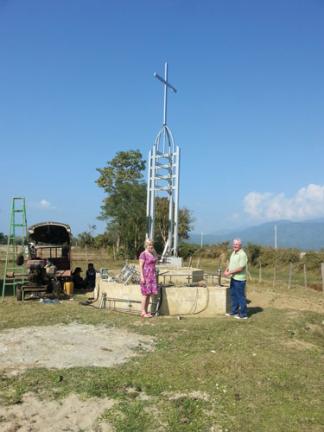Easter dawns in Myanmar after 50 years
In his Easter message this year, Cardinal Bo, the Archbishop of Yangon, reflected on the return to democracy after 50 years of debilitating and authoritarian military rule.
“Dear Brothers and Sisters, Easter breaks forth like a river in the long desert. It is a very special Easter today for the people of Myanmar. The river of democracy is slowly spreading its splendour in the long desert of hopelessness. We people of Myanmar today celebrate Easter with signs of resurrection around us. It is the early morning of Easter in Myanmar. ‘Happy Easter’!”
Myanmar’s new democratic government was sworn in on March 30, 2016, and took office a few days later on April 01.
Speaking just before Easter in Geneva on March 15 at the United Nations Human Rights Council Cardinal Charles Bo had this to say:
“My country, Myanmar, now stands on the threshold of hope. After over half a century of brutal oppression at the hands of a succession of military regimes and after more than sixty years of civil war, we now have the possibility to begin to build a new Myanmar, to develop the values of democracy, to better protect and promote human rights, to work for peace. Myanmar has woken to a new dawn, with the first democratically elected government. We have a chance – for the first time in my lifetime – of making progress towards reconciliation and freedom as a nation. There is a vibrant civil society and a freer media. We know that while evil has an expiry date, hope has no expiry date. And yet there is a very, very long way to go; there are many, many challenges to confront; and no one should think that the election of a new government means that our struggle is over. It is just the very beginning”.
Just the very beginning and the list of challenges is enormous: Poverty, education, human trafficking, drugs, protecting freedom of expression, constitutional reform, religious conflicts, the economy and health care. These are just some of the challenges. In Myanmar today, 60% of children never finish primary school, maternal mortality is the highest in the region and the country has the lowest doctor to patient ratio in the region. Myanmar is the second biggest producer of opium in the world.
We stand on the threshold of hope.
This report was prepared by Columban Frs Patrick O'Donoghue and Neil Magill from Myanmar.
 A poignant visit
A poignant visit
Columban Fr John Walsh was shot and killed on the night of March 23, 1964, near Mogaung in the Diocese of Myitkyina, Myanmar. He was returning to his parish having gone to get some medicine for a sick parishioner. Some people heard the raised voices and the shot which killed him but were too afraid to come out as it was dark.
The following morning when his body was recovered from his shallow grave, his rosary beads were in his hands and a bullet hole in the back of his head. It is believed that he was shot by the military in retaliation for the shooting of two Buddhists monks by Kachin rebels some days previously. The place where he was shot was a short distance from an army checkpoint.
John, who was 43 and had been in Burma for 12 years, is buried in Myitkyina. The people of Mogaung have never forgotten their much loved pastor. A large cross was erected at the spot where he was shot. There was a plan to build a small chapel there to commemorate the 50th anniversary of his death but due to refusal of permits, ownership of the land and other factors that was changed.
Once the Church was able to finally buy a small area of land around the site of his death, it was decided to create a memorial garden with a steel cross to replace the one made of concrete. That cross is now almost complete.
In mid-January, 2016, John’s nephew Jerry Slattery and niece Jean Ross came from Ireland for a short visit to Myanmar. Upon arrival in Myitkyina they were very warmly and graciously received. They immediately visited John’s grave. But the highlight of their visit to Mogaung was meeting a large group of parishioners, some of whom were alive at the time John was shot.
The parishioners were overjoyed at being able to welcome some of John’s family. Jerry and Jean were overwhelmed by the warmth and delight of the people and very moved at how they have preserved the memory of their uncle. It was something they could never have imagined.
But there was poignancy too and more than a few tears were shed as stories were recounted. Jerry and Jean had brought with them photocopies of the letters John had regularly sent to his mother while in Burma. They gave these to the community.
But the most treasured item they had was the rosary beads that John held as he was shot. This had been given to John’s mother, who is now dead, by Columban Bishop John Howe, who at that time was the Bishop of Myitkyina. It was the family’s wish that, rather than a particular family member receiving this treasured item, it would be kept in Mogaung as a very tangible memory of their loved pastor.
The people found it hard to express their deep gratitude that the family would want to do this. But it is probably exactly what John himself would want – a reminder, perhaps, that he is still watching over and praying for them from heaven. As one of the people said, “We never fear walking that narrow road even at night as Fr John is continually looking after us”.
After their few short days in Myitkyina, Jerry and Jean left Myanmar, having established a new and valued relationship with the people of Mogaung.
Columban Fr Patrick O'Donoghue is part of the Columban team in Myanmar.